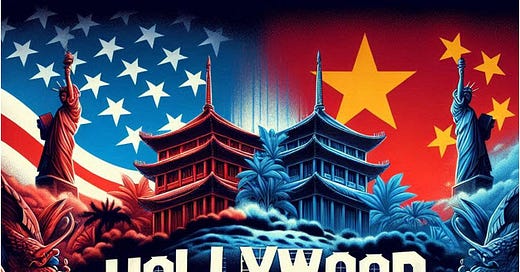
China & Donald Trump Give Hollywood Something To Gripe About
China threatens limited Hollywood film ban in response to tariffs
Hollywood is always complaining about prices rising and box office lowering. Now President Donald Trump can be giving the studios something to really complain about.
The ongoing trade war between the U.S. and China has now extended its impact to Hollywood. U.S. President Donald Trump's tariffs on China have led Chinese regulators to reduce the number of American films allowed in the country. This move is a direct response to the tariffs imposed by Trump, which have escalated tensions between the two largest economies.
China, the world's second-largest film market, has been favoring homegrown titles recently, such as "Ne Zha 2," which made over $2 billion from Chinese ticket sales alone. The China Film Administration stated that the U.S. government's misuse of tariffs will further reduce the domestic audience's favorability towards American films. They plan to moderately reduce the number of American films imported while continuing to introduce excellent films from around the world to meet market demand.
Despite the pandemic, Hollywood movies have still performed well in China. For instance, "Avatar: The Way of Water" made $246 million of its $2.3 billion global total from China. However, the new policy could impact upcoming releases like Disney's "Avatar: Fire and Ash".
In 2023, U.S. imports made around $950 million in China, a small fraction of the country's overall market. Hollywood needs every dollar it can get, as movies like "Godzilla vs. Kong" were significantly boosted by Chinese ticket sales. Studios typically see about 25% of the box office money from China due to international taxes and other factors. This reduction in revenue could be a significant setback for Hollywood.
Chinese moviegoers may also be less inclined to support American movies due to the ongoing trade war. Hollywood has already been struggling to depend on China's box office, and this new policy could further exacerbate the situation. The industry is facing more volatility than ever, and the long-term ramifications of this trade war could be severe.
China's decision to curb the number of U.S. films allowed to screen in the country mirrors suggestions from influential Chinese bloggers. They proposed a heavy reduction on the import of U.S. movies and further investigation of the intellectual property benefits of American companies operating in China.
China's film market has been increasingly dominated by domestic offerings. For example, the animated fantasy film "Ne Zha 2" has taken $1.8 billion in China, making it the highest-grossing film of 2025 so far. Despite this, Hollywood blockbusters were expected to boost China's year-end box office totals.
Donald Trump has laughed off China's decision to reduce the number of U.S. movies allowed to play in the country. An Imax spokesperson expressed confidence that their robust slate in China, including Hollywood, Chinese, and international films, will not be materially impacted.
“I think I’ve heard of worse things,” Trump answered while laughing and cracking a smile as the room of reporters also chuckled.
An Imax spokesperson told Variety: “We are pleased that China Film Administration has clarified its position on U.S. film imports and highly confident – given our decades of business and strong relationships in the country — that Imax’s robust slate in China, which includes Hollywood, Chinese and international films, will not be materially impacted. We continue to expect a strong year for Imax in China, coming off our highest grossing first quarter ever in the country.”










